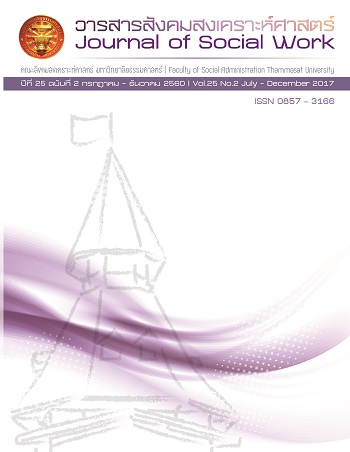A Confirmatory Factor Analysis of Self-Compassion among Social Work Students
Keywords:
Self-compassion, Social work students, Confirmatory factor analysisAbstract
The purposes of this research were to study the elements of Self-compassion. Data were collected from 534 undergraduate social work students from 5 University in Thailand in the academic year 2016 using a 1-5 rating scale questionnaire with 40 question items , The questionnaire had reliability of 0.83
The data were analyzed with confirmatory factor analysis. The results result from Confirmatory Factor Analysis of models measuring the undergraduate students. The research results found that 1) There were 3 factors of Self-compassion of social work students, consisted of Self-kindness , Awareness of common humanity and Mindfulness. The Self-compassion model in accordance was fit with the empirical data with =1.52 df=1 p=.21 GFI=1.00 AGFI=0.99 CFI=1.00 RMSEA=0.03 SRMR=0.01 . Standardize factor loading between .65 and 0.83. All elements are statistically significant at 0.01 level. This proves that the models can explain, with standardized factor loading, Self-compassion in descending order.
References
สุวิมล ติรกานันท์. (2556). ระเบียบวิธีวิจัยทางสังคมศาสตร์: แนวทางสู่การปฏิบัติ.กรุงเทพฯ :จุฬาลงกรณ์มหาวิทยาลัย.
สำนักงานคณะกรรมการอุดมศึกษา. นักศึกษารวม ปีการศึกษา 2559. ค้นหาเมื่อ 9 ธันวาคม 2559 จาก http://www.info.mua.go.th/information/
Brown, B. (2012). Daring greatly: How the courage to be vulnerable transforms the way we live, love, parent, and lead. New York : Gotham.
DuBois, B., &Miley,K.K.. (2014). Social work : an empowering profession. 8thEdition. Boston : Pearson
Gilbert, P. (2009).The Compassionate Mind: A New Approach to Life's Challenges. Oakland Canada : New harbinger Publication.
Kirkpatrick, Kristin Le Clair. (2005). Enhancing Self-Compassion Using a Gestalt Two-Chair Intervention.Retrieved October 20, 2015, from https://www.lib.utexas.edu/etd/d/2005/kirkpatrickd27295 /kirkpatrickd27295.pdf
McGonigal, Kelly. (2011). The Willpower Instinct: How Self-Control Works, Why It Matters, and What You Can Do To Get More of It. New York : Penguin Group.
Mistler, Brooke A. (2010). Forgiveness, Perfectionism, and the Role of Self-Compassion.Dissertation, Ph.D.The Graduate School of the University of Florida.Photocopied.
Neff,K.D. &Costigan, A. P. (2014,June).Self-Compassion, Wellbeing , and Happiness.Retrieved November 10, 2015, fromhttp://self-compassion.org/UTserver/pubs/Neff&Costigan.pdf
Neff,Kristin.D. (2003a,April). Self-compassion: An alternative conceptualization of a healthy attitude toward oneself. Self and Identity. 2(2):85–101.
Neff,Kristin.D. (2003b,April).The Development and Validation of Scale to Measure Self-Compassion.Self and Identity, 2,223–250.
Reyes, D. (2011). Self-Compassion: A Concept Analysis. Journal Holist Nurse published Retrieved October 1, 2015, from http://jhn.sagepub.com/content/early/2011/10/21/0898010111423421
Rickers, S. (2012). The Lived Experience of Self-Compassion in Social Workers. Dissertation, Ph.D. Faculty of the Graduate School of The University Of Minnesota. Photocopied.
Ying, Y.W. & Han, M. (2009,July). Stress and coping with a professional challenge in entering masters of social work students: The role of self-compassion. Journal of Religion and Spirituality in Social Work: Social Thought.28(3): 263-283.
Downloads
Published
How to Cite
Issue
Section
License
The manuscripts published in the Social Work Journal is the copyright of the Social Work Journal, Thammasat University
Any article or opinion appeared in the Social Work Journal will solely be under the responsibility of the author The Faculty of Social Administration, Thammasat University and the editors do not need to reach in agreement or hold any responsibility.



